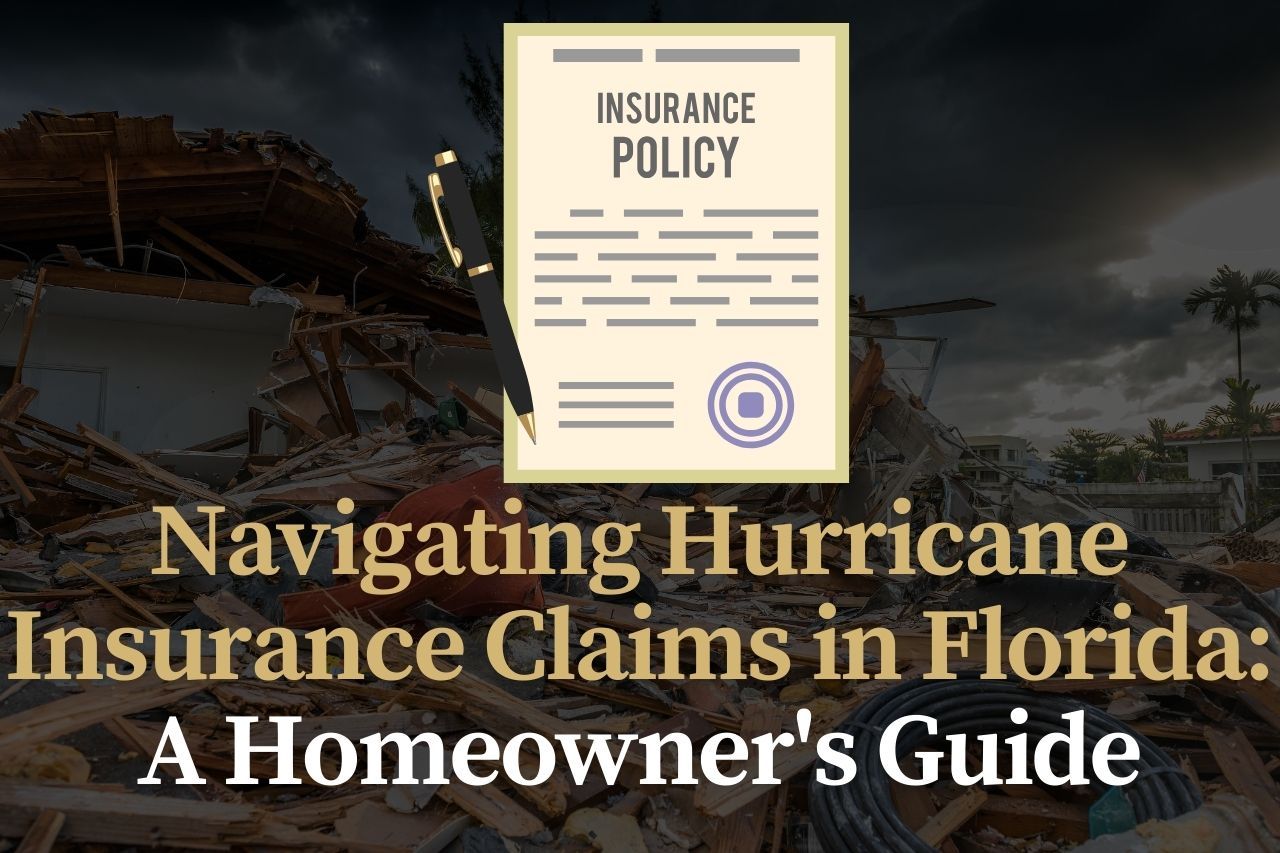Navigating Hurricane Insurance Claims in Florida: A Homeowner's Guide
5/11/2025 | 4 min read

Introduction: Sarah's Story
When Hurricane Helene struck the Florida Panhandle, Sarah Thompson returned to her Pensacola home to find extensive wind and water damage. Overwhelmed and uncertain about the next steps, Sarah's experience highlights the importance of understanding the insurance claims process after a hurricane in Florida.
Understanding Your Insurance Policy
Before a hurricane strikes, it's crucial to comprehend the specifics of your insurance coverage.
Review Your Policy Details
-
Coverage Limits and Deductibles: Know the maximum amount your policy will pay and the deductible you'll need to cover out-of-pocket.
-
Hurricane Deductibles: In Florida, hurricane deductibles are typically a percentage of your home's insured value, not a fixed dollar amount.
-
Exclusions: Standard homeowners insurance often doesn't cover flood damage. Consider purchasing separate flood insurance through the National Flood Insurance Program (NFIP).
Additional Living Expenses (ALE)
If your home becomes uninhabitable due to hurricane damage, your policy may cover additional living expenses such as hotel stays, meals, and transportation. Keep all receipts and records of these expenses.
Immediate Steps After the Hurricane in Florida
1. Ensure Safety First
Before assessing damage, ensure it's safe to enter your property. Look out for hazards like downed power lines, gas leaks, or structural damage.
2. Document All Damages
Thorough documentation is critical for a successful claim.
-
Photographs and Videos: Take clear, timestamped photos and videos of all damages, both interior and exterior. Include wide-angle shots and close-ups.
-
Inventory of Damaged Items: Create a detailed list of damaged belongings, including descriptions, purchase dates, and estimated values.
-
Preserve Damaged Items: Don't discard damaged items until the insurance adjuster has assessed them.
3. Mitigate Further Damage
Take reasonable steps to prevent additional damage, such as covering broken windows or tarping roofs. Keep receipts for any expenses incurred during these temporary repairs.
For more detailed guidance, explore this step-by-step guide by Louis Law Group.
Filing Your Insurance Claim in Florida
1. Contact Your Insurance Company Promptly
Notify your insurer as soon as possible. Florida law requires insurers to acknowledge receipt of a claim within 14 days and accept or deny the claim within 90 days after receiving all necessary information.
2. Provide Necessary Documentation
Submit all collected evidence, including photos, videos, and the inventory of damaged items, to your insurance company.
3. Schedule an Adjuster Inspection
Your insurer will assign an adjuster to assess the damage. Be present during the inspection to point out all damages and provide any additional information.
4. Keep Detailed Records
Maintain a log of all communications with your insurance company, including dates, times, and summaries of conversations.
Understanding Claim Deadlines
In Florida, you typically have one year from the date of loss to file a hurricane insurance claim and 18 months for supplemental claims. However, it's advisable to file as soon as possible to avoid complications.
How Louis Law Group Can Help
Navigating the insurance claim process can be complex. Louis Law Group specializes in assisting Florida homeowners with hurricane insurance claims, ensuring they receive fair compensation.
Their experienced attorneys can help interpret policy details, gather necessary documentation, and advocate on your behalf during disputes.
Discover more about our services on the Louis Law Group property damage claims.
FAQs
Q1: How soon should I file an insurance claim after a hurricane?
A: As soon as possible. Prompt filing helps ensure a quicker response and reduces the risk of claim denial due to delays.
Q2: What if my insurance claim is denied?
A: You can appeal the decision. Review the denial reasons, gather additional evidence, and consider consulting with legal experts.
Q3: Does homeowners insurance cover flood damage?
A: Standard policies typically do not cover flood damage. Separate flood insurance is required for such coverage.
Q4: Can I make temporary repairs before the adjuster arrives?
A: Yes, but document all repairs and keep receipts. Avoid permanent repairs until after the adjuster's assessment.
Q5: Will filing a claim affect my insurance rates?
A: While multiple claims can impact premiums, a single claim for significant damage typically does not.
Conclusion
Filing a hurricane insurance claim in Florida requires prompt action, thorough documentation, and an understanding of your policy. By following these steps, you can navigate the process more effectively and ensure a smoother recovery.
Are you prepared to take these essential steps to protect your home and family after a hurricane?
Contact Louis Law Group today for a free consultation. Call 833-657-4812 or submit a free case evaluation form to get started. Don’t wait—let us help you take the first step toward justice and financial recovery.
How it Works
No Win, No Fee
We like to simplify our intake process. From submitting your claim to finalizing your case, our streamlined approach ensures a hassle-free experience. Our legal team is dedicated to making this process as efficient and straightforward as possible.
You can expect transparent communication, prompt updates, and a commitment to achieving the best possible outcome for your case.
Free Case EvaluationLet's get in touch
We like to simplify our intake process. From submitting your claim to finalizing your case, our streamlined approach ensures a hassle-free experience. Our legal team is dedicated to making this process as efficient and straightforward as possible.
12 S.E. 7th Street, Suite 805, Fort Lauderdale, FL 33301
